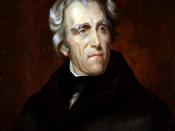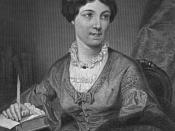The 1820s and 1830s in America were times of sweeping change. Jacksonian
democracy brought more power to common citizens, and engendered ideals of wide
spread liberty. Jacksonian democrats believed that they were guardians of the
Constitution, political individual liberty, and economic opportunity. Although
their beliefs did not apply to the Indians that they displaced, they were
correct in their evaluation of themselves.
Jacksonian democrats believed that they were guardians of the Constitution.
Thy believed that they upheld its principles, and defended its ideals of an
"equal" society. They took the Constitution at its face value, without reading
into it. Jacksonians believed that they defended political democracy. They
supported a government that represented all of its people, not just the wealthy.
In their minds, it was important that all white men have the right to vote, not
just the rich white men. They believed that they protected individual liberty.
Locke's natural rights were held in high esteem.
Government should ensure these
rights, they thought. They believed that they propagated economic opportunity.
Upward mobility was what the land of opportunity was known for, and they
believed that was one of the better aspects of America, and should be preserved
at all costs.
Jacksonians did a good job of upholding these ideals. In July of 1830, an
act regarding the Bank of the United States was submitted to President Jackson
for signature, he flatly vetoed it on the grounds that it was not "compatible with
justice...or with the Constitution" of the United States. He believed that it was
unconstitutional for a single financial institution to enjoy "a monopoly of the
foreign and domestic exchange." Committed to the ideal of expanding the country,
he worked hard to acquire territory to hold the expanding population. Political
democracy blossomed under Jacksonian democracy. George Henry Evans, a...


